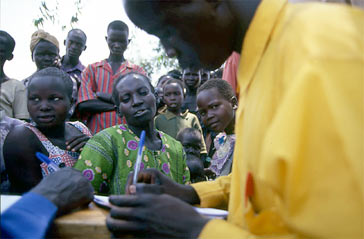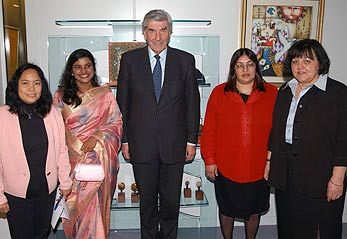Lubbers calls on governments to overcome fear towards refugees and deal with root causes of displacement
Lubbers calls on governments to overcome fear towards refugees and deal with root causes of displacement

GENEVA, Dec. 12 (UNHCR) - Describing the world's millions of uprooted people as "products of political failure" High Commissioner Ruud Lubbers Wednesday called on governments to overcome their fear towards refugees and asylum seekers and to address the root causes of forced displacement.
Lubbers told the nearly 80 ministers and other officials gathered at the Palais des Nations in Geneva that the 1951 Convention during its lifetime had helped "millions of people throughout the world" to find safety and build new lives, but the 22 million people UNHCR was currently helping were "products of political failure."
The two-day conference, jointly hosted by UNHCR and the Swiss government and attended by a total of 156 countries, was expected to adopt what UNHCR called a landmark declaration reaffirming the commitment by signatory states to effectively implement the 1951 Convention and its 1967 Protocol. Lubbers has called it the "most important" refugee meeting since the original conference.
The High Commissioner said new problems, including massive migration, had led governments to refuse refugees because of their increasing numbers and because they are frequently mixed in with economic migrants. He said governments and UNHCR should work together to create a positive climate for refugees and asylum seekers and build what he called "a culture of respect."
The Convention "is fundamentally about freedom from fear," Lubbers said, but "Unfortunately, governments' policies towards refugees and asylum seekers are often based on fear and mistrust. Political leaders are no leaders when they fuel anti-foreigner and anti-refugee sentiments, contributing to this cycle of fear and mistrust."
The High Commissioner's remarks came against the background of the September 11 attacks in the United States, the tightening of immigration policies in many countries and a growing tendency to confuse asylum seekers with criminals and terrorists.
For its part, the United States reaffirmed its support for the Convention and its 1967 Protocol, saying that the when the voluntary repatriation of refugees is not possible, they should be resettled and integrated into their new societies.
"While the United States must undertake new measures to protect our national security, we cannot and will not permit the tragic events of September 11 to compromise our longstanding tradition of providing refuge and assistance to those in need," Alan J. Kreczko, the Acting Assistant Secretary of State for Population, Refugees, and Migration, told the conference.
In a message to the conference, UN Secretary General Kofi Annan said there would be no refugee problem "if only the Charter of the United Nations and the Declaration of Human Rights were fully respected."
Annan said there was a tendency to equate refugees "at best with economic migrants, and at worst with cheats, criminals, or even terrorists."
"We must refute this gross calumny," Annan said. "Refugees are not criminals. They are victims of autocratic or abusive regimes, of conflict, and of criminal smuggling rings."
A key aspect of the conference will be to look at ways of emphasising the importance of the Convention's so-called "exclusion clause," which makes persons guilty of serious crimes, including terrorism, ineligible for refugee status.
Lubbers emphasised the need to address the root causes of forced displacement of millions of people. "The real challenge is to create an environment in which people are not forced to flee their homes in the first place," he said. "Of course, it is better to bring safety to people, not people to safety. But when the international community fails to do this, as it frequently does," he continued, "we must uphold the right of people to seek and enjoy asylum."
The High Commissioner said more needed to be done to deal with the links between migration and asylum, and reminded ministers that the Convention was not an instrument to control migration and should not be blamed for what he said was the failure of states themselves in this area.
He said that because many regular arrival routes had been closed to them, an increasing number of refugees turn to smugglers to reach safety while economic and other migrants portray themselves as refugees in order to get around the immigration barriers.
"The result is a blurring of the distinction between refugees and other migrants, and a stigmatisation of refugees as people trying to break the law," he said. "We must develop new approaches, tools and standards to strengthen the legal and physical protection of refugees, while separating out the undeserving."
Lubbers called for more international cooperation to prevent protracted refugee situations such as Afghanistan, where millions of people have languished for decades in refugee camps. He called on the international community help refugees return to their country and assist all Afghans in building a sustainable peace, democracy and respect for human rights.





